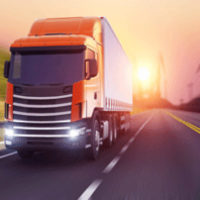How Automation Will Impact the Future of the Trucking Industry
April 3, 2019 Autonomous technology continues to be a hot topic in the transportation industry, particularly in the commercial trucking industry. There are undeniable benefits to utilizing autonomous trucks, including increased productivity and potentially fewer devastating truck accidents.
Autonomous technology continues to be a hot topic in the transportation industry, particularly in the commercial trucking industry. There are undeniable benefits to utilizing autonomous trucks, including increased productivity and potentially fewer devastating truck accidents.
However, the shift towards self-driving trucks is likely to have a significant impact on the labor pool, as many of the higher paying trucking jobs may be replaced by an autonomous vehicle. A recent study conducted by researchers at the University of Pennsylvania examined how self-driving trucks will impact the trucking industry, the individuals who drive these trucks, and the safety of the roads and highways across the country.
Increased Productivity
One of the main benefits of autonomous technology in the trucking industry is the potential for increased productivity. In fact, according to the study, automation could triple productivity, because unlike truck drivers who are required to take breaks in order to rest between shifts, self-driving trucks can operate around the clock, particularly on the long spans of uninterrupted highway.
This is why trucks are the leading choice for early adoption of self-driving technology. Approximately $1 billion annually has been budgeted for new development projects.
Impact on Trucking Jobs
Researchers involved in the study and other industry officials warn that the shift towards autonomous technology will have a negative impact on the labor pool. The high and mid-wage jobs, in particular, are at risk of being eliminated and replaced with poor-quality, low-paying jobs.
Ultimately, autonomous trucks could replace up to 294,000 long-distance drivers over the next 25 years. The only jobs that may be available involve human drivers transporting trailers from factories and warehouses to autonomous truck ports (ATPs), which are often located near major interstate exits. The driver will then be responsible for picking up the trailer at the ATP.
Switching to Autonomous Technology
According to the study, the for-hire long haul truckload sector will most likely make the transformation to autonomous technology first. As a result, these drivers are the most vulnerable to lose their jobs. Truckload drivers are also vulnerable because they are usually hired exclusively for driving.
Approximately 211,000 long-distance jobs are at risk of being eliminated. Other jobs in the trucking industry, including local driving jobs like delivering packages, pay significantly less than some of the positions that are at risk of being phased out.
The study author did say that there will still be employment opportunities, including non-driving tasks like interacting with customers and coupling tractors and trailers. Many workers who have left the industry may be interested in returning if the job does not require them to be away from home for weeks at a time.
Ultimately, the study suggests that it is in everyone’s best interest to embrace the technology and figure out how it can benefit the trucking industry, the truck drivers, and other motorists sharing the road.
Baltimore Truck Accident Lawyers at LeViness, Tolzman & Hamilton Secure Compensation for Truck Accident Victims
If you have been injured in a truck accident involving a self-driving truck, you are urged to contact the Baltimore truck accident lawyers at LeViness, Tolzman & Hamilton. We will conduct a thorough investigation into the details of your case and determine who is responsible for your injuries. Our dedicated team will secure the maximum financial compensation you deserve and ensure that your legal rights are protected at all times. To schedule a free, confidential consultation, call us today at 800-547-4LAW (4529) or contact us online.
Our offices are located in Baltimore, Columbia, Glen Burnie, and Towson, allowing us to represent truck accident victims in Maryland, including those in Anne Arundel County, Baltimore County, Carroll County, Harford County, Howard County, Montgomery County, Maryland’s Western Counties, Prince George’s County, Queen Anne’s County, Southern Maryland, and the Eastern Shore, as well as the communities of Catonsville, Essex, Halethorpe, Middle River, Rosedale, Gwynn Oak, Brooklandville, Dundalk, Pikesville, Nottingham, Windsor Mill, Lutherville, Timonium, Sparrows Point, Ridgewood, and Elkridge.






